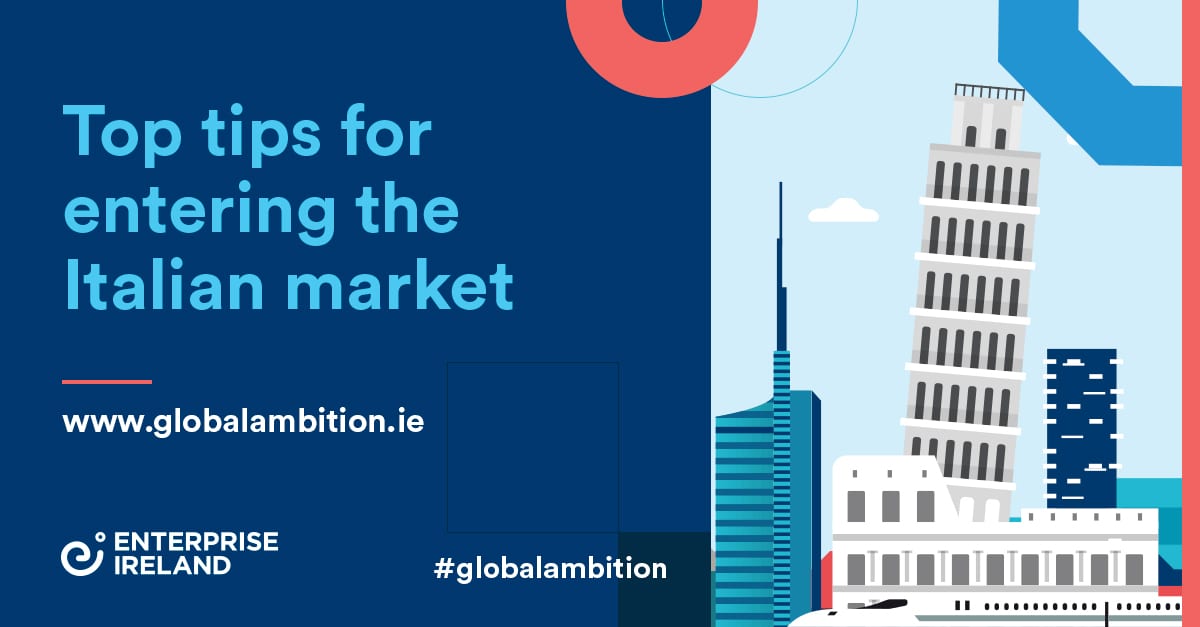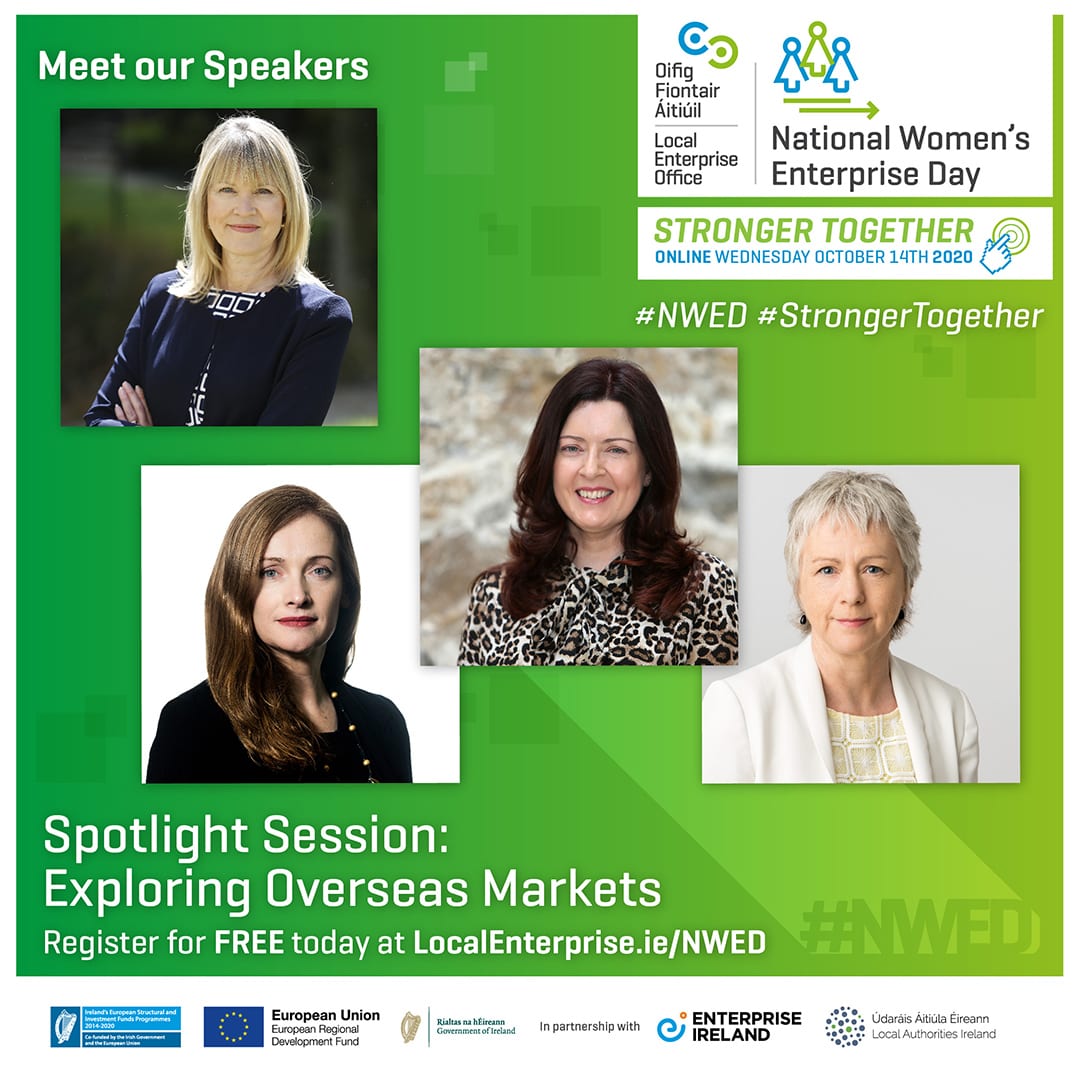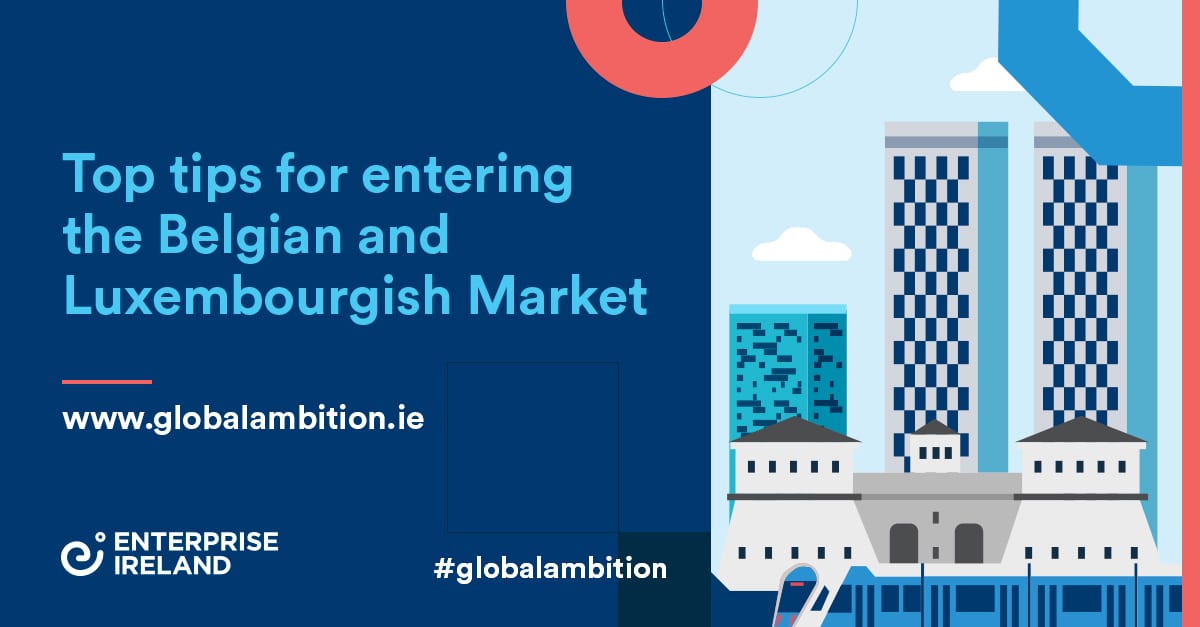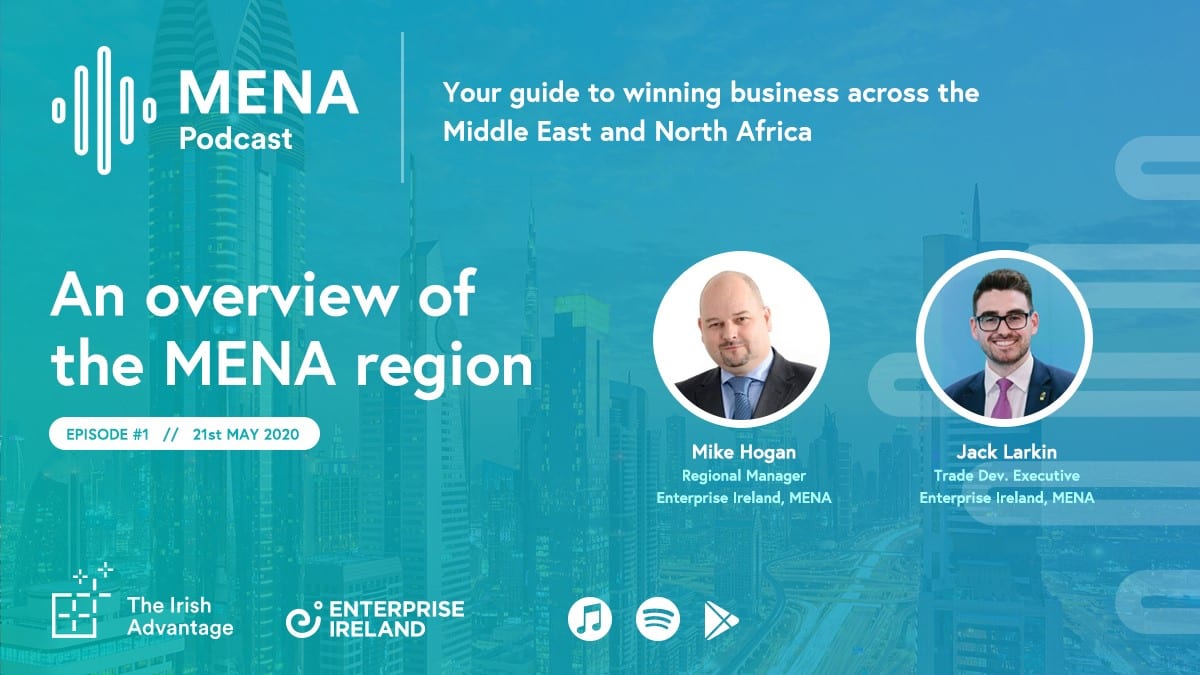Market Watch Industry Bulletin – Aerospace & Aviation

If you are considering doing business in Italy, please be sure to explore our tips to enter the market below and also be sure to reach out to our team in Milan.
If you are considering doing business in Italy be sure to reach out to our team and read our Going Global Guide for more information.

National Women’s Enterprise Day 2020, organised by the Local Enterprise Offices, was like no other in that, because of Covid, for the first time in its 14-year history, it took place entirely online.
In all other ways, it was exactly the same – providing women with the inspiration, support and confidence to start and grow a business.
Sheelagh Daly, Entrepreneurship Manager at Enterprise Ireland, has been involved in this flagship event for women in business right from the start.
National Women’s Enterprise Day was an initiative set up by the Local Enterprise Offices in 2007, supported by Enterprise Ireland.
“Back then the landscape was quite different in that there was a dearth of female entrepreneurial role models. If you went back and looked at the newspapers, for example, there weren’t many women being profiled in a business or entrepreneurial setting,” says Daly.
“Research shows that role models are an important way to inspire women and give them the confidence to start a business. So we knew we needed to profile women who had done it successfully already. It was that whole concept of ‘to be it you have to see it’,” she says.
But a lack of role models wasn’t the only challenge.
“At the time there was also a real lack of access to business networks for women. While the Chambers of Commerce were, of course, important, they tended to be for more established businesses. More informal networks, such as rugby clubs and golf clubs, didn’t provide the same level of access to women.”
There was a need for “a mechanism to provide women with access to networks in order to inspire, demonstrate and build confidence in female entrepreneurship,” she says.
National Women’s Enterprise Day was just the mechanism.
“It was also a means to disseminate the huge range of supports available from lots of different government agencies, not just from Local Enterprise Offices and Enterprise Ireland, but from Intreo, Failte Ireland and the Credit Review Office,” she explains.
“The idea was to bring all these things under one roof, on one day, with one big bang that would put female entrepreneurship on the map.”
It did just that. “The first event was held in Mullingar and was fantastic, and overbooked, so we carried on.”
Indeed, the event grew so much that in recent years the Local Enterprise Offices have run regional versions too, to enable even more women to attend.
All followed the same proven format of enabling participants to listen to successful women at different stages of their business journey, to gain an understanding of the supports available to them, and to have an opportunity for networking.
“Then, in 2020, we had Covid,” she says.
Having supported so many businesses to ‘pivot’ to online to cope with the pandemic, the network of Local Enterprise Offices were quick to do the same with National Women’s Enterprise Day. It took place on Wednesday 14th October, entirely remotely, and was a huge success.
“We saw an enormous attendance of 1641 people which was amazing and well reflected this year’s theme of ‘Stronger Together’,” says Daly.
Speakers included Olympian turned businesswoman Derval O’Rourke, who talked about the strength, discipline and resilience required to deliver peak performance in one sector before pivoting to another.
Sonia Deasy, founder of international beauty brand Mortar & Pestle, spoke about her journey taking a brand from “local to global”.
A series of ‘leading lights’ included successful female entrepreneurs across a range of sectors, from Clare Hughes of CF Pharma in Kilkenny to Mary Walsh of Ire-Wel Pallets in Wexford and Odilon Hunt of AVA Audio Visual in Sligo.
Sheelagh Daly hosted a panel discussion entitled “Exploring Overseas Markets”, featuring expert commentary from Anne Lanigan, Enterprise Ireland’s Regional Director Eurozone, and Marina Donohoe, Enterprise Ireland’s Director for UK and Northern Europe.
As well as exhorting female entrepreneurs to explore Eurozone markets, they pointed out that the UK will always be hugely important to Irish businesses too.
Marcella Rudden, Head of Enterprise with Local Enterprise Office Cavan explained the questions to address when starting your export journey.
“She spoke about how to choose a market to target and how the Local Enterprise Office should be your first port of call because it has the supports to help you, both financial and otherwise,” says Daly.
One of the main threads running through the day was not to be afraid of exporting, she says. “The message was that it isn’t something that should be seen as intimidating and that there is help available.”
That help is not just from Local Enterprise Offices but from all sorts of sources, including networks for women in business in countries such as France and Spain, delegates heard.
“Before you commit to a market do the research, make sure that it’s the right market for you and that you can compete in it, and don’t be afraid to ask for help,” says Daly.
Information is crucial. Both men and women have similar business ambitions but research indicates that women take a more cautious approach, including in areas such as borrowing for business. They typically “prefer more information before they take a risk”, says Daly.
“The ambition is very much there but the approach is different.”
National Women’s Enterprise Day 2020 took place in a year which also saw the launch of Enterprise Ireland 2020 Action Plan for Women in Business. This important six-year strategy to support female entrepreneurship was launched in February, just before Covid.
“The reason such emphasis is being put on women is because we are still looking at a much higher proportion of men in leadership and entrepreneurship,” explains Daly.
This needs addressing because, both as an economy and a society, we “need the skills and talents of all our population to be realised,” she says.
We also need those businesses that are started to be the best they can. “All the research demonstrates that the greater the diversity the stronger, more profitable and faster-growing the business,” says Daly.
“That leads to wider economic benefits, so it’s a real economic imperative that everybody, regardless of gender or other diversities, does not face barriers when it comes to starting or growing a business.”
The video interview discusses the effects of the current Covid-19 situation on new technologies, forecasts on the industry and alternative ways of connecting with stakeholder in the market.
See the webinar here.
In this time of uncertainty and disruption, Irish BPO and IT companies have demonstrated impressive flexibility in providing their outsourced services to ensure international companies can overcome these engagement challenges from a remote setting and provide a positive customer experience.
Following Enterprise Ireland’s recent Industry Bulletin which looked at developments across the world affecting Irish BPO and IT Services companies, this edition of our Market Watch series focuses on the UK region and a key end-market for many Irish companies; the UK energy sector.
This webinar reflects on the
Panellists:
David Corcoran, Senior Market Advisor, Enterprise Ireland UK
Peter Haigh, former Managing Director of Bristol Energy, CEO of ELEXON, and Director of Business Retail at E.ON.

The Enterprise Ireland Belgium and Luxembourg team are here to help you prepare, launch and succeed in your export activities. We are eager to share the expertise and network gained from studying, working and living in the market. Don’t hesitate to get in touch with our team of dedicated Market Advisors to help you with your export strategy.
Belgium truly is the heart of Europe and has proven itself to be a hub of international business and networking, a large market in its own right, and also a great test market for companies with the ambition to grow and scale in the wider European region.
For more be sure to read our Belgium Going Global Guide
Luxembourg may be one of the smallest EU countries, but has become world leader in finance and administration, hosting 3,900 investment funds and fostering new opportunities for SME’s.
Finally, do your research! Explore the different resources available from Enterprise Ireland to delve deep into the market and really understand the opportunities and challenges that will arise. Our world-class Market Research Centre provides countless market reports, and MA’s are happy to help with market-related requests.
For more be sure to check out our Going Global Guide Luxembourg

A typical smartphone, for example, is made up of components and materials sourced from up to a dozen suppliers on multiple continents, which are shipped to a manufacturer for final assembly before being sent onwards to distributors, retailers and ultimately sold to consumers.
This presents two major problems for manufacturers and others involved in the chain – visibility and provenance. A new project led by Dublin-based Exertis Supply Chain Services, with funding from Ireland’s Disruptive Technologies Innovation Fund (DTIF), is aimed at solving both of them.
A subsidiary of DCC, Exertis Supply Chain Services is a leader in materials supply chain design and operation. “Our focus is on technology and we provide global supply chain capability for the Exertis group and clients across the globe,” says Brian Cassidy, Head of IT and Director responsible for data protection with the company. “We are also a centre of excellence within the group for the use of blockchain technology.”
The Disruptive Technologies Innovation Fund is a €500 million fund run by Ireland’s Department of Business, Enterprise and Innovation, as part of the National Development Plan under Project Ireland 2040. It is administered by Enterprise Ireland, the trade and innovation agency. An example of the country’s strong focus on developing some of the world’s most innovative companies, the initiative funds collaborations between research facilities and ambitious companies to develop innovative technologies that change the world in which we live.
The objective of Exertis’s DTIF-supported project, which also involves Dublin-based technology company Sonalake and the CeADAR Technology Centre located at University College Dublin, is to develop a blockchain-based platform, which will transform the technology product supply chain.
“We are using the blockchain to provide a peer-to-peer platform for authenticating provenance and we are providing visibility across the supply chain where multiple partners and a high volume of products are involved.”
The current lack of visibility and difficulty with provenance result in a number of issues. “In terms of visibility, for any participant in the supply chain it is very difficult to know what is selling and what is not,” says Cassidy.
This lack of visibility leads to problems with availability. “Typically, the retailer might know what the distributor has in stock but won’t know what the manufacturer has. Visibility is very much limited to one point up or down in the chain. A manufacturer may not know how much product distributors or retailers have because they usually don’t share that information.”
Provenance is another issue. “When the item does arrive at the retailer, proving its authenticity can be a really interesting challenge. If a fake product comes into a customer’s hands, a manufacturer wants to be able to see how it got there.”
The Exertis project is highly innovative in that it will provide an open platform for multiple users in multiple supply chains, with each participant being able to decide which other members of the chain they wish to share information with. Furthermore, it will allow them to share selected pieces of information with selected participants.
Once the data gets put on the blockchain it is immutable and cannot be deleted. “It is encrypted and decrypted at a granular level,” Cassidy adds. “A retailer might want to put a transaction on the platform but may not want competitors to know anything about it, whereas they do want the distributor and manufacturer to know. However, they may not be able to share with the manufacturer certain details such as the price they paid for it or what they sold it for. They can decrypt different parts of that dataset for different partners and their ERP system will be able to dynamically decide what information to share and who to share it with.”
Manufacturers will be able to see what is selling and how much product is in the channel in real time. This is important for planning manufacturing output, as well as for managing warranty liabilities. “Manufacturers will usually know how many units were sold, but don’t know exactly when. They need to know that for when the warranty starts. This platform will address that issue. It provides a place where all participants in the chain can contribute, but everyone controls their own data.”
Initial work on the project, began in 2018, with the DTIF-supported three-year project beginning in earnest in August 2019. “The DTIF funding has accelerated this project significantly and facilitated our collaboration with CeADAR and Sonalake. At Exertis, we have looked across our business and identified several exciting use cases, which we expect to roll out in several areas in the coming years”.
For more information and call dates for the Disruptive Technologies Innovation Fund visit the Department of Business, Enterprise and Innovation website.
The company provides global mobility solutions for IoT, automotive and mobile device companies around the world, from Germany’s Volkswagen Group to US satellite communications company Kymeta.
The software innovator, which has received funding from Enterprise Ireland, today employs 150 people. It experienced particularly fast growth last year and was recruiting new team members right up until January, when the first inklings of the Covid-19 crisis emerged. When it did, the company acted swiftly.
“The senior team was very focused on getting as much information in as possible early in the Covid-19 life stage. There was a focus on human impact and economic impact. We did some very detailed analysis on the impact to the company and took the right amount of time to assess the steps that needed to be taken to ensure the sustainability of the company. Once this was done the teams could be reassured and day to day work could continue as before,” says Richard Springer, the company’s Director of Commercial Strategy.
“People have come first and this has been led from CEO level down. There have been cost reductions and tighter control of the financials but at the same time, we are still driving the business forward to make sure we come out of this period in a strong position.”
As a technology company, it helped that remote working and the use of tools such as MS Teams and Zoom were already well established in the company.
Once the scale of the crisis was assessed, all staff members were asked to work from home, with some international staff flying home to their native countries to work from there. The use of video and teleconferencing has ensured productivity has been maintained ever since.
Decision making was quick and efficient at the top, with the senior team participating in daily catch-ups every morning. What were previously weekly catch-ups were turned into reviews of what was happening in key markets worldwide, as well as planning for the recoveries in each.
The key to successfully managing the crisis for the company so far has been to focus on ensuring there was “over communication” with both staff and customers as both cohorts adjusted to remote working.
“That meant giving people more information, communicating at a more personal level about how their family is, for example, and ensuring there was more collaboration,” says Springer, who says that acknowledging the ‘human’ side of current events is vital. “It’s about making sure the team is okay and that everyone knows what is happening.”
Being empathetic and working to safeguard employees’ physical and mental health was paramount too, with new programmes in areas such as yoga and mindfulness introduced for staff.
Cubic Telecom has customers all over the world, which means travel has always been a staple part of its customer relationship management. Business development strategies traditionally include a presence at major international trade shows, such as CES in Las Vegas and the Mobile World Congress in Barcelona, with vital support provided by Enterprise Ireland.
With such events no longer taking place, the company quickly predicted that customer relationships would need to be maintained and developed remotely too.
“We spent the first few weeks of the lockdown focusing on customer relationships, talking to existing customers,” he says.
While nothing replaces face to face meetings, he says, by again focusing on the human side of the situation, and encouraging collaboration, these relationships are successfully being strengthened remotely.
Although a pandemic is never welcome, the fact that Cubic Telecom is by now so well recognised in its sectors internationally helps. “We are at a point where a lot of our relationships are very well established. As a business we are also still small enough to move fast, but big enough to be recognised in the industry as a player,” he explains.
Enterprise Ireland’s backing from its earliest days led to Cubic Telecom unlocking a series of investments as it grew, including from major industry players such as Audi and Qualcomm, among others. More recent investment has come from long term backer ACT Venture Capital and the European Investment Bank.
The connected intelligence company is now acknowledged as a pioneer in eSIM technologies and advanced data analytics, offering mobility solutions for IoT, automotive and mobile device companies across the globe.
It has mobile operator partnerships in more than 190 countries, for example. One of the most recent, with Etisalat, a UAE telecoms company, was announced at an Enterprise Ireland trade mission to the Middle East.
While it is not business as usual for the company right now – too much outside its walls have changed – it is business as ‘best as possible’.
“Our employees are well informed about what is going on, our business is running as it was previously and supply chains are open and running,” he says.
As a supplier, it is critical to understand that “everyone is experiencing different impacts to their business,” he advises.
“It does not matter what size that business is, during this time everyone could be under pressure. That is the key when dealing with any business during this time. There needs to be a collaborative approach in how to get through the next months together and as much sharing of impacts, plans and information as possible to help each other.”

Download the bulletin here.
The video interview took place on 10th March 2020, prior to Covid 19 restrictions.